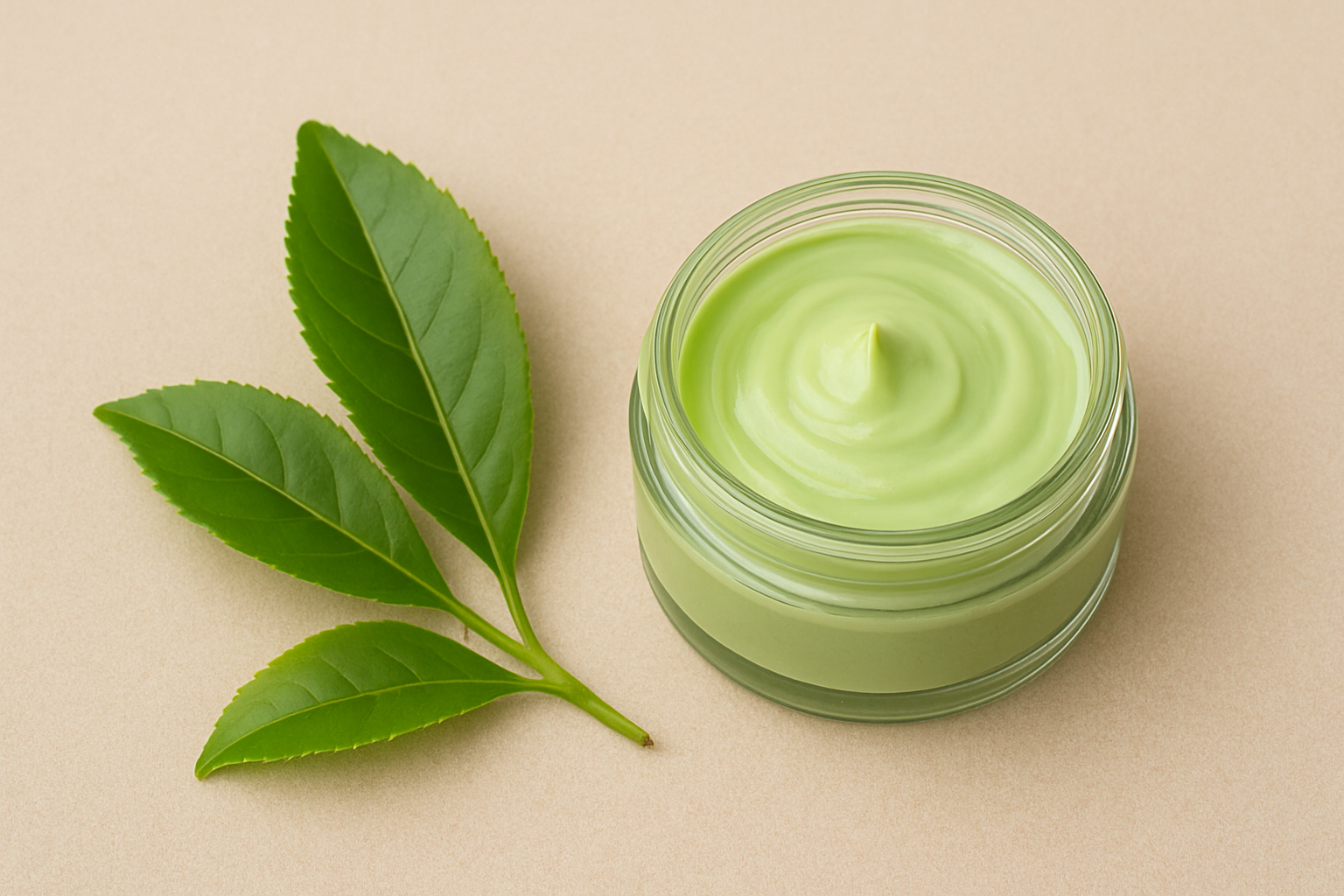
Why do we use Camellia Sinensis (Green Tea)?
There are few ingredients in the skincare world as universally celebrated as Green Tea Extract. Used for centuries in traditional cultures and now backed by extensive modern science, it is a true multi-tasking powerhouse. As a premier antioxidant in our ingredient glossary, we are proud to include it for its remarkable protective and soothing abilities.
What is Camellia Sinensis (Green Tea) Leaf Extract?
Camellia Sinensis is the botanical name for the tea plant. It’s important to note this is a different species from Camellia oleifera, the plant that gives us nourishing Tea Seed Oil. Depending on how the leaves are harvested and processed, you can get green, black, or oolong tea. Green Tea is made from fresh leaves that are quickly steamed to prevent oxidation, which preserves their most potent compounds.
The real magic of Green Tea Leaf Extract lies in its high concentration of polyphenols, a class of powerful plant-based compounds. The most significant of these are the catechins, and the most abundant and active catechin is Epigallocatechin Gallate (EGCG). EGCG is the source of most of green tea’s incredible skin benefits.
Source:
- Linus Pauling Institute – Oregon State University: Tea and Skin Health – An excellent scientific overview of the active components in tea and their effects on skin.
The Good: 4 Science-Backed Benefits of Green Tea Extract
Green Tea Extract is primarily a protective, anti-inflammatory, and soothing ingredient. Its benefits are extensive and well-documented.
1. It’s a Supreme Antioxidant Powerhouse
Every day, your skin is exposed to free radicals from UV rays, pollution, and other environmental stressors. These unstable molecules cause oxidative stress, which breaks down collagen, damages skin cells, and leads to premature aging (fine lines, wrinkles, uneven tone).
Green Tea’s EGCG is one of the most powerful antioxidants discovered. It expertly neutralizes free radicals, helping to:
- Protect skin cells from environmental damage.
- Prevent the breakdown of collagen, keeping skin firm.
- Visibly reduce the signs of premature aging.
Source:
- Journal of the American Academy of Dermatology: Green tea polyphenols: A powerful antioxidant for skin protection – This paper highlights the potent antioxidant and protective qualities of green tea polyphenols.
2. It’s a Potent Anti-Inflammatory and Soothing Agent
Inflammation is the root cause of many skin issues, including redness, sensitivity, and acne. Green Tea Extract is a fantastic soothing ingredient that can visibly calm signs of irritation. This makes it highly effective for:
- Reducing redness and calming sensitive skin.
- Soothing skin after exposure to stressors.
- Promoting a calm, even complexion, making it beneficial for people with rosacea-prone skin.
3. It Helps Protect Skin From UV Damage
Important Note: Green Tea Extract is not a sunscreen. However, research has shown that when applied topically, it can help mitigate some of the damage caused by UV radiation. The polyphenols help to reduce the inflammation and free radical damage that occurs after sun exposure. Think of it as an extra layer of defense that works alongside your daily sunscreen.
Source:
- Oxidative Medicine and Cellular Longevity (Journal): Green Tea Polyphenols: A Powerful Protector Against Photoaging – This review details the mechanisms by which green tea helps protect skin from the effects of UV light.
4. It’s Beneficial for Oily and Acne-Prone Skin
Studies have demonstrated that the EGCG in green tea can help reduce sebum (oil) production on the skin. Additionally, it has antimicrobial properties that can help inhibit the growth of bacteria that contribute to breakouts. This dual-action approach makes it a valuable ingredient for those looking to achieve a more balanced and clear complexion.
The Bad: Are There Any Downsides?
Green Tea Extract is overwhelmingly safe and beneficial, with an excellent track record in cosmetics. The “bad” is less about the ingredient itself and more about the nuances of formulation.
- Formulation and Concentration Matter: The effectiveness of Green Tea Extract depends entirely on its concentration in a product and the stability of the formula. A product with a tiny amount listed at the very end of the ingredient list won’t deliver the same benefits as one where it’s a key active.
- Stability Can Be an Issue: As a potent antioxidant, EGCG can be prone to oxidation (losing its effectiveness) when exposed to air and light. For this reason, it’s best to choose products packaged in opaque, air-restrictive containers (like airless pumps) to protect the integrity of the extract.
- Potential for Irritation (Extremely Rare): While celebrated for being soothing, any botanical ingredient carries a minuscule risk of an allergic reaction in a very small number of individuals. However, Green Tea is considered one of the least irritating active ingredients available.
Source:
- National Institutes of Health (PubMed): Protective Mechanisms of Green Tea Polyphenols in Skin – This scientific review concludes that due to their safety, antioxidant, and anti-inflammatory properties, green tea polyphenols are “promising chemopreventive agents for skin disorders.”
The Verdict
Camellia Sinensis (Green Tea) Leaf Extract is a scientifically-backed, A-list skincare ingredient. Its unparalleled ability to protect the skin from environmental damage, combined with its powerful soothing properties, makes it a valuable component for nearly every skin type.
When you see it in our products, you can be confident that it is working hard to defend, calm, and maintain the health and youthfulness of your skin.
Frequently Asked Questions about Green Tea Extract
Yes, Green Tea Extract is very beneficial for acne-prone skin. Its anti-inflammatory properties help to calm redness and irritation, while its ability to help reduce sebum (oil) production can lead to a more balanced, clearer complexion.
EGCG (Epigallocatechin Gallate) is the most abundant and powerful antioxidant compound (a catechin) found in green tea. It is responsible for the majority of green tea’s protective and soothing benefits for the skin.
No, absolutely not. Green Tea Extract is not a sunscreen and does not provide an SPF rating. While it can help reduce some of the cellular damage caused by UV rays, it must be used alongside a broad-spectrum sunscreen for proper sun protection.
Find Green Tea Extract in Our Products
(will be updated soon)
Other sources used for this article:
- mdpi.com and
mdpi.com - National Institutes of Health – nih.gov and
National Institutes of Health – nih.gov and
National Institutes of Health – nih.gov and
National Institutes of Health – nih.gov and
National Institutes of Health – nih.gov and
National Institutes of Health – nih.gov and
National Institutes of Health – nih.gov and
National Institutes of Health – nih.gov - Horniman Museum
- paperandtea.com
- bluescoffeeandteaco.com
- Frontiers
- colorescience.com and
colorscience.com - True Botanicals
- indiatimes.com
- researchgate.net
